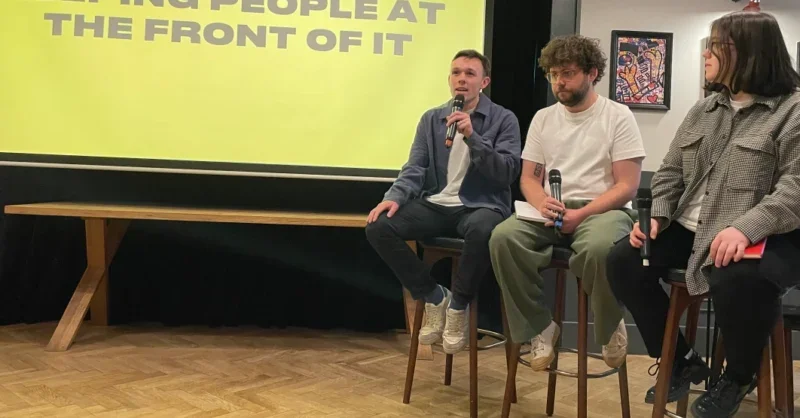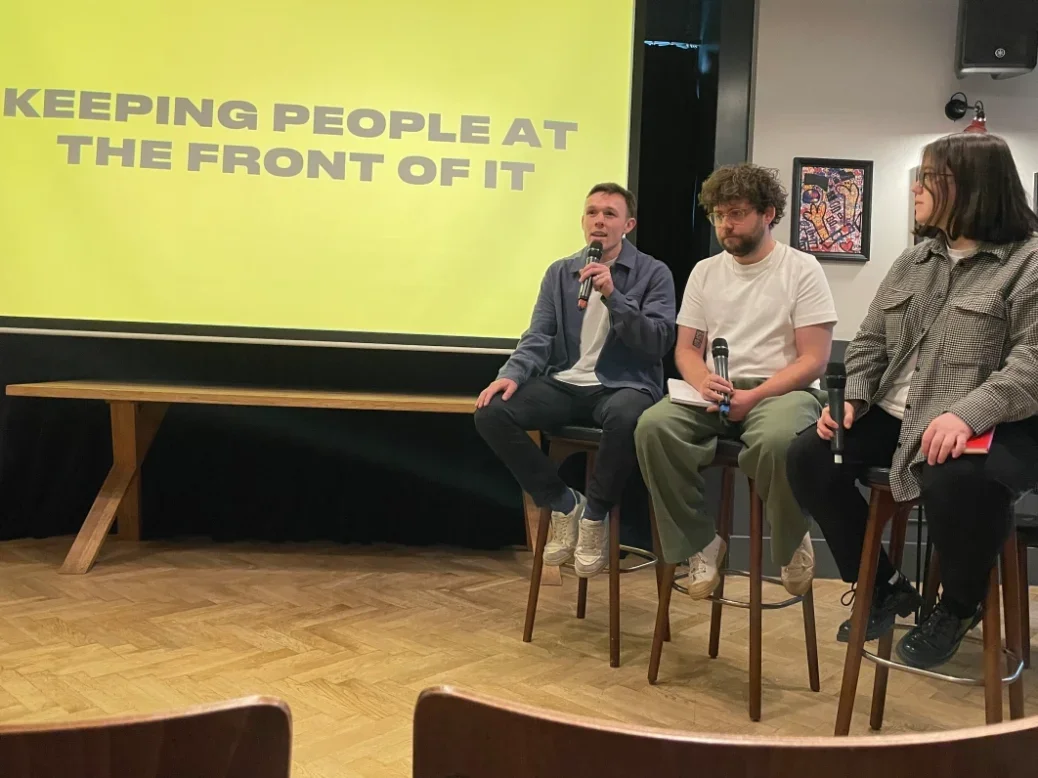Physical Address
304 North Cardinal St.
Dorchester Center, MA 02124
Physical Address
304 North Cardinal St.
Dorchester Center, MA 02124


The algorithm is described as “The Boss” and “A Beast” by editors at Ladbible, Joe and Metro who all used “authenticity” as the guard for their social media production.
In a survey of 30 digital journalists from MetroThe TelegraphThe Reach And Joe by Creative Agency Taylor Herring Between January and March, 23% said that their social news channels were the main focus of the year that came while 39% said they became increasingly important.
At an event in London to launch the report on Thursday, the editors discussed the challenges of addressing users’ attention in the milliseconds before continuing to roll.
Joe Media editor George McKay said: “I think one of the negative sides of the social revolution is that … everyone consumes only little sweets, the candies are the content that everyone wants to share, and they are simple and they are nice, and they stop browing, and they are really engaging and viral.
“Every time we as editors say, okay, you have had your sweets, but now is the time to eat your greens, and this is a content that you should probably get involved in – no one wants to do it. So the task we have to fight with is, how do we sneak the green through the sweets?
“So that is how we package these things in a way that is engaging and then it thinks about what it means for specific platforms, because it will look different on Tiktok, which will look different on a website and will look different on Facebook. So it is the same content, but actually in three different iterations.”
Jack Peat, head of the editorial news room at Taylor Herring and a former editor at Joe Media, found that this touches on “the platform versus the publisher’s rivalry, because in a way you must have the platform, you must have the audience as it gives, but you are in competition with them at the same time”.
McKay responded: “I don’t think it will ever be where a publication will just be social or will be complely off social. It will always be that balance, because it has to be. Because the thing is, with a platform, there is an algorite. Algorithm, and if you can build a direct relationship with the audience, that is way more powerful in every single way, but that also has to be on social. So it’s this kind of power imbalance of attention.
“Of course we all compete with each other up here, but we also compete directly with Facebook. We compete with Tiktok, we compete with these creators.”
McKay also noted that “Away is Halcyondagarna 2015, 2016 when social media was really on the ascent, where you can post anything and it can do well. Part of it is algorithmic, but I also think the audience is just demanding now, which is good, but that means we have to increase our game.”
He said that Joe is looking at three important issues at the beginning of the commissioning process when deciding whether a content has a “reasonable chance to succeed”: what the heading will be, what the pictures will be and what the caption will be. If they are not satisfied with them in the beginning, he said, it is not worth doing – both because “money is tight” and because pages are punished by the social platforms if they publish underperforming content.
McKay added: “We have to keep the audience on the page, but then we also have to consider the degree of commitment versus click speeds and find that balance is where you can see real success on a platform, because you can not just go for one or the other, especially when it comes to the site.
“So we really have to find that balance. So the way in Always Tell my editors to do this, is to (think) which way is the content telling you to go? So again, you have to be brutal with yourself, but it is this a piece of pie No, Why are We Trying to Make Them? And is it a Piece of Content That People Are Going to Want to Share or Comment with, and if the Answer is no, it’s Probly Something that people will click, why we almost try to do it.
Ladbible editor Ben Smith also talked about the power of the algorithms. He described his relationship with them and said, “I mean, the boss of the algorithm, isn’t it? But I believe for me as an editor, we have the information for the traditional news editor, but one thing we really have to master is the algorithm and it dictates what we do.
“And sometimes it means that the best content is not necessarily not always the ones that perform and you have to be able to tell journalists it and they do not always understand. And these social platforms always preach, we want original content, and we will do a great function with a lot of investigative work, and it will not work for almost the levels to do so.
He continued: “I have worked at LAD for nine years, and you develop almost a sixth feeling and an instinct of when an algorithm changes, and then you have to dig the information, and you have it, you have got the theoret and you have these hypotheses, and sometimes it works, sometimes it does not … so we are very much on grace of social platforms.
“Even if you know you are doing good content and doing the right thing, it can be a little annoying that you can’t do anything about it, almost.”
Smith said that user -generated content from creators and everyday people is the key and describes Ladbible as “almost as if you have been framed in social time because of the content bank we have”.
He said that Ladbible’s “main goal” is to identify “what gets viral, or even better, what we can do becomes viral” so often sources content from social media, both through staff rolling on their own flows and with a more systemic set that uses data. But it still uses traditional methods like Newswires and talks to sources.
He said, “You will not come to Ladbible for your American business but may come for a 20-second clip by Donald Trump, and that’s the type we are looking for in the morning.”
Smith added that “people-led” content creates high-performing videos for Ladbible: “I think it kind of validates the story. In a world of fake news if you can see the person on which the story is centered, you are more likely to read it.”
McKay at Joe similarly talked about the importance of authenticity: “At Joe, there is an expectation with our policy content that we will handle it in a certain way.”
He named Joe’s political team Ava Evans, Ed Campbell and Oli Dugmore. McKay said: “At Joe, there is an expectation with our policy content that we will handle it in a certain way … We have these names and these faces that people respect them.
“So that’s how you build the authentic relationship with an audience, but then how you use that relationship over all these different platforms and through these different media, such as newsletters, such as podcast, such as long -shaped video, articles.”
DMG Media-owned Metro has “gone really heavy” on social media over the past 18 months, with an emphasis on social video that has seen it go from a team of one to 17, told social video Alex Goldsmith to the event. The brand also has a commercial video arm upwards and works with brands.
She said: “I think that for Metro it was really just a recognition that it was now or never, and we had to go hard to ensure that we were in the right place for the future and really future -resistant our presence in social video.”
In addition to its main accounts on Tiktok and Instagram, Metro has separate pages for games, entertainment, travel and sports. Its Main TikTok account crossed a million followers in January in January And is now 1.7 million while its core Instagram page is 259,000.
Goldsmith said that the reasons behind expanding to games is that it has “such massive potential when it comes to reaching the audience, and I think we are exploring things now in addition to news when it comes to our original content”.
She said that a mantra for the subway is “keeping people in front” on everything they do, both when it comes to using user -generated content and their own journalists.
“I think there is a type of a two -time strategy for it, in the sense that you can always look at the audience as a creator as well. We use a lot of user -generated content because it feels most organic for what they are used to seeing, and that’s how they consume a lot of it too,” she said.
“But then I think in a different sense, it is also really informed about how we have gone to build our channels. From the beginning, our theory and hypothesis even if we become a little slower to begin with, if we have our social video journalists and our talent over what we do, it will always be the most engaging content and therefore the most valuable content.
She quoted a new Metro explains that Strand was fronted by the videotapes Anna Staddon, known for science and technical content, whose first episode received more than one million views within a few days.
Goldsmith said that the members of the team are “those who are online every day, browse. They understand the conversation, what happens. So it is natural that they are also in front of the content.”
Goldsmith also talked about the importance of saying “no” because of the risk of destroying all Metro’s hard work with a video that underperforms.
“Many people have many ideas, and many people in the news room believe that they know what will work on social video, but in fact the algorithm is a beast, and it is so complicated, and we are so make sure we know exactly what will work and what does not come, and we have that instinct …
“There is a lot of texture in what we do, we package many of our stories in very similar ways. And although we are now branching ourselves to make much more repeatable format and original content, we do it slowly and in a really considered way we will not move, because we all have CPI.
“And in general, if we post something that is completely different, it will not only refuel that video, but it will refuel everything around it. So we are extremely careful about what we post.”
E-mail pged@pressgazette.co.uk To point out mistakes, enter History Tips or submit a letter for publication on our “Letters Page” blog